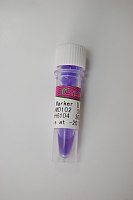【小常识】Ethanol Precipitation of DNA
丁香园论坛
1140
Ethanol Precipitation of DNA
Ethanol precipitation is frequently used for concentration of DNA solutions and for removal of protein, salt, and unincorporated nucleotides. The two most common protocols use either 0.3 M sodium acetate (0.1 volume of 3 M) or 2.5 M ammonium acetate (0.5 volume of 7.5 M), along with 2 to 2.5 volumes of ethanol. Studies at Invitrogen (1, 2) have shown the two salts to be equally effective for recovery of small amounts of DNA from small volumes and for removal of unincorporated nucleotides from labeling reactions. DNA was found to precipitate readily with room temperature ethanol and room temperature centrifugation. For DNA concentrations >0.1 礸/ml, no incubation period is required. For improved recovery of DNA from dilute solutions (<10 ng/ml), overnight incubation in the ethanol and extended (30 min) centrifugation is recommended. Addition of ammonium acetate to 2.5 M (without ethanol) has also been shown to be effective in precipitating proteins while leaving the DNA in solution (2).
1. Zeugin, J.A. and Hartley, J.L. (1985) FOCUS?/sup> 7:4, 1.
2. Crouse, J. and Amorese, D. (1987) FOCUS 9:2, 3.
http://www.invitrogen.com/content.cfm?pageid=1297&cfid=6866876&cftoken=38115178
注:我们在实验中发现,DNA制品中过高的盐浓度会影响后面的实验。曾经有人提议利用高浓度醋酸铵对DNA制品中的蛋白进行盐析,代替经典的酚氯仿抽提,但是这种方法制备的DNA中盐浓度很高,影响某些酶的切割,如KpnI和SacI等使用低盐反应条件的酶。所以,我们后来放弃了该方法。这也提示我们,企图从原理上改动“分子克隆”这本圣经很困难。
Ethanol precipitation is frequently used for concentration of DNA solutions and for removal of protein, salt, and unincorporated nucleotides. The two most common protocols use either 0.3 M sodium acetate (0.1 volume of 3 M) or 2.5 M ammonium acetate (0.5 volume of 7.5 M), along with 2 to 2.5 volumes of ethanol. Studies at Invitrogen (1, 2) have shown the two salts to be equally effective for recovery of small amounts of DNA from small volumes and for removal of unincorporated nucleotides from labeling reactions. DNA was found to precipitate readily with room temperature ethanol and room temperature centrifugation. For DNA concentrations >0.1 礸/ml, no incubation period is required. For improved recovery of DNA from dilute solutions (<10 ng/ml), overnight incubation in the ethanol and extended (30 min) centrifugation is recommended. Addition of ammonium acetate to 2.5 M (without ethanol) has also been shown to be effective in precipitating proteins while leaving the DNA in solution (2).
1. Zeugin, J.A. and Hartley, J.L. (1985) FOCUS?/sup> 7:4, 1.
2. Crouse, J. and Amorese, D. (1987) FOCUS 9:2, 3.
http://www.invitrogen.com/content.cfm?pageid=1297&cfid=6866876&cftoken=38115178
注:我们在实验中发现,DNA制品中过高的盐浓度会影响后面的实验。曾经有人提议利用高浓度醋酸铵对DNA制品中的蛋白进行盐析,代替经典的酚氯仿抽提,但是这种方法制备的DNA中盐浓度很高,影响某些酶的切割,如KpnI和SacI等使用低盐反应条件的酶。所以,我们后来放弃了该方法。这也提示我们,企图从原理上改动“分子克隆”这本圣经很困难。

![2-[N-(2-hydroxyethyl)-3-methoxy-4-nitroso-anilino]ethanol,733686-00-5,阿拉丁](https://img1.dxycdn.com/p/s14/2024/0619/989/6399538481105633081.jpg!wh200)


